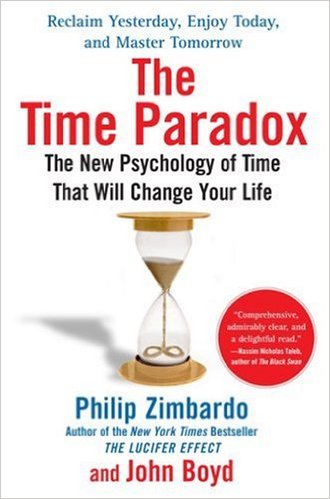The Time Paradox: The New Psychology of Time That Will Change Your Life

The Time Paradox – The New Psychology of Time That Will Change Your Life may have a hyperbole for a sub-title but the insights that it provides are valuable. I try to look for new perspectives to view the world around me. Being a consultant and speaker means I meet lots of people and it helps to be able to understand where they’re coming from. This book provided me another way to frame my thinking about how others think differently.
The short summary is that people have different ways that they view time. Some folks look to the past and view it negatively – -reflecting and remembering only those things that happened that were bad. Some look to the past and draw from it the warm moments like roasting marshmallows and making smores. Some folks are more focused on living for the moment, what the book calls a present hedonistic focus. Still others view the present from a fatalistic point of view. That is they believe everything is fated and that what they do doesn’t matter. Finally, there are folks that focus on the future. They’re willing to sacrifice today for a better tomorrow.
In reality there are aspects of each of these in every person. Sometimes we are able to live in the moment. Sometimes we’re willing to remember those camping trips with our family. However, we all have tendencies towards one or more time perspectives. For instance, I have an interesting mix of future orientation and present orientation.
The book’s web site allows you to calculate your perspectives on time using a standard scale. My future score is 4.15. (Pretty high) This isn’t a surprise to the folks who know me. I replaced mulch beds with rock beds in places because it had a lower long term maintenance cost. I’ve replaced the siding on my house with concrete board that can’t rot. My deck is made of composite materials that won’t rot. My furnaces are both heat pumps with gas backup which is more expensive to install but has the best long term operational costs. I drive a 12 year old Lexus ES 300 because it’s reliable. If you offer me a choice between something that’s slightly cheaper today or has good long term benefits I almost always choose the option which will have the best long term benefits.
I also tend to view the past relatively positively (3.3 past-positive vs. 2.8 past-negative). On the present measurements I score very low on the present-fatalistic measurement (1.2) and moderately on hedonistic (3.7). I’m sure that I could improve my perception of the past to improve my overall outlook – and I know that I can get better at living in the moment (present-hedonistic) – but that’s actually one of the points of the book. Once you know what your time perspectives are you can work to gently nudge them into a more healthy perspective. (At least more happy, see my book review of Stumbling on Happiness.)
For me the book provides a context for evaluating my own perspectives and for understanding why other folks might not understand the inherent benefits of solutions that have long term rewards. If you’re interested in psychology, how you think or how to relate to others I think you’ll like The Time Paradox – The New Psychology of Time That Will Change Your Life.
